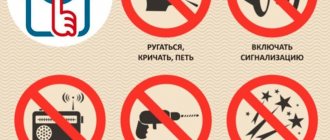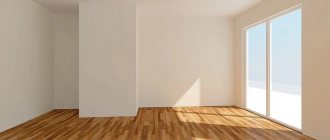Why is silence in an apartment important?
In all subjects of the Russian Federation, violating the silence regime is subject to administrative liability.
If guests or you yourself disturb the peace of others (for example, during repair work), you will have to pay a fine. In some regions, first-time violators can get by with a warning; in others, a fine is issued immediately. The best way not to lead to an endless stream of complaints to the police and tax authorities is to come to an agreement with your neighbors. If you have noisy neighbors, guests will no longer like it - they may make complaints against you or write a bad review about your stay. In this case, it makes sense to unite with the rest of the residents in the house and jointly complain about loud tenants. Call the local police officer when they make noise, write a collective complaint, record a video in which you can hear their noise for evidence.
What to do if your neighbor breaks the law
Muscovites are lucky: if there is noise in a neighboring apartment, just call “102” - the dispatcher will redirect the call to an authorized organization. The territorial police departments will be in charge of recording the fact of the offense and its further registration. In other constituent entities of the Russian Federation, the procedure is similar, but you will have to seek justice for your neighbor directly from the internal affairs bodies.
In general, the procedure for protecting rights looks like this:
- Contact the police or management organization by phone.
- Take measures to record the fact (record it on audio or video, call other neighbors as witnesses).
- Seek prosecution by writing a statement to the local government authority.
Since the fine for violation is noticeable, their desire to violate the sound regime will disappear for a long time.
What is considered noise in regulatory documents
The rights to silence and acceptable noise levels are enshrined in the following documents:
— Federal Law of March 30, 1999 No. 52-FZ “On the sanitary and epidemiological welfare of the population” (as amended on July 26, 2019); — Decree of the Government of the Russian Federation of January 28, 2006 No. 47 “On approval of the Regulations on recognizing premises as residential premises, residential premises unsuitable for habitation, an apartment building in disrepair and subject to demolition or reconstruction, a garden house as a residential building and a residential building as a garden house” (as amended on 29.11 .2019).
According to them, the maximum noise level that is permissible in residential premises is 55 dBA (acoustic decibels) from 7 a.m. to 11 p.m., and 45 dBA from 11 p.m. to 7 a.m. For comparison:
- 20 dBA - human whisper,
- 55–80 dBA - alarm ringing,
- 70–80 dBA - the sound of a working coffee grinder or the whistling of a kettle,
- above 120 dBA - noise on the motorcycle and auto racing circuit.
Rules and regulations vary by region. Let's tell you more about them.
Moscow
Actions that disturb the peace and quiet of citizens:
- use of televisions, radios, tape recorders, sound amplifiers and other devices;
- playing musical instruments, shouting, whistling, singing and similar actions;
- use of vehicle alarm sounds;
- noise from pyrotechnics;
- noise from repair, construction, unloading and loading operations;
- and “other actions” that disturb the peace and quiet of citizens.
When you can't make noise. From 23 to 7 o'clock.
The time for repair and construction work is also specified separately. They cannot be held from 19 to 9 o'clock and from 13 to 15 o'clock. A complete ban on them was introduced on Sundays and non-working holidays. An exception to this rule is if the house was put into operation no more than 1.5 years ago.
What is the responsibility? Warning or administrative liability in the form of a fine:
- for individuals - from 1000 to 2000 rubles;
- for officials - from 4,000 to 8,000 rubles;
- for legal entities - from 40,000 to 80,000 rubles.
Documents regulating the silence regime.
— Moscow City Law of July 12, 2002 No. 42 “On maintaining the peace of citizens and silence in the city of Moscow” (as amended on December 14, 2016);
- Article 3.13. Code of the City of Moscow on Administrative Offenses (as amended on May 22, 2019).
Time frame for work for Moscow and regions
How long it takes to make repairs in an apartment depends on the subject of the Federation. For example, in the Moscow region the same rules apply as in the capital (from 9 to 13, from 15 to 19). For the period of self-isolation in 2021, even more stringent restrictions were introduced, prohibiting construction from 11 a.m. to 5 p.m. - on regular days and on Saturdays.
Time frame for maintaining silence in Moscow
If conflicts arise with neighbors, it is important to know when the house was put into operation and to which locality it belongs. Self-organization should not be discounted. Residents of the house can independently agree on what time to engage in construction. You can involve the management company in negotiations.
Moscow region
Actions that disturb the peace and quiet of citizens:
- use of sound reproducing devices and sound amplification devices at high volumes,
- shouting, whistling, singing, playing musical instruments,
- noisy excavation, construction, unloading and other types of work using mechanical means and technical devices.
When you can't make noise. The system here is more complicated than in Moscow.
“Loud use of sound reproducing devices and sound amplification devices” must be stopped from 21:00 to 08:00 and from 13:00 to 15:00 on weekdays, as well as from 22:00 to 10:00 and from 13:00 to 15: 00 on weekends.
“Shouting, whistling, singing, playing musical instruments,” as well as carrying out “noisy excavation, construction, unloading and other types of work” is prohibited from 21:00 to 08:00 on weekdays and from 22:00 to 10:00 on weekends.
The time for construction and repair work in an apartment building also depends on the cadastral registration of the house.
If this happened no more than 6 months (six months) ago, work must be interrupted from 21:00 to 08:00 and from 13:00 to 15:00 on weekdays, as well as from 22:00 to 10:00 and from 13: 00 to 15:00 on weekends.
If more than 6 months have passed, then repairs must be stopped from 19:00 to 09:00 and from 13:00 to 15:00 on weekdays, from 19:00 to 10:00 and from 11:00 to 15:00 on Saturday. A complete ban on repairs and construction awaits you on Sundays and non-working holidays.
What is the responsibility? For the first violation - a warning or fine:
- for citizens - from 1000 to 3000 rubles;
- for officials - from 5,000 to 10,000 rubles;
- for legal entities - from 20,000 to 50,000 rubles.
The second violation within a year entails payment of a fine:
- for citizens - 4000 rubles;
- for officials - from 15,000 to 30,000 rubles;
- for legal entities - from 60,000 to 80,000 rubles.
For the third and subsequent violations within a year, the fine is even higher:
- for citizens - 5,000 rubles;
- for officials - 50,000 rubles;
- for legal entities - from 100,000 to 150,000 rubles.
Documents regulating the silence regime.
— Law of the Moscow Region of March 7, 2014 No. 16/2014-OZ “On ensuring peace and quiet of citizens in the Moscow Region” (as amended on June 13, 2019);
- Article 3.1. Code of the Moscow Region on Administrative Offenses (as amended on November 29, 2019).
Photo: shutterstock.com
WHAT ARE WEEKENDS
According to Art. 111 of the Labor Code of the Russian Federation (hereinafter referred to as the Labor Code of the Russian Federation), weekends are a weekly uninterrupted rest. The duration of weekly continuous rest cannot be less than 42 hours (Article 110 of the Labor Code of the Russian Federation). With a five-day work week, the employer provides two days off, and with a six-day week, one. The general day off, according to the Labor Code of the Russian Federation, is Sunday. From this we can conclude: for a five-day work week, it is more convenient to set both days off in a row - Saturday and Sunday or Sunday and Monday.
Since the duration of weekly continuous rest is calculated from the end of work on the eve of the day off until the start of work (shift) on the next day after the day off, another procedure for providing days off is:
• not typical for a five-day working week with an eight-hour working day (rather, we can talk about shift work based on the total recording of working hours);
• is not beneficial for the employer, since the total period of rest time is longer than with “classic” days off.
Saint Petersburg
Actions that disturb the peace and quiet of citizens:
- use of sound-reproducing and sound-amplifying sound reinforcement devices;
- screaming, whistling, knocking, moving furniture, singing, playing musical instruments and other similar actions;
- use of pyrotechnics;
- noisy repair, construction and loading and unloading operations.
When you can't make noise. From 23:00 to 08:00 on weekdays and from 23:00 to 12:00 on weekends and non-working holidays. The exception is the use of pyrotechnics on New Year's Day, from 23:00 on December 31 to 4:00 on January 1.
What is the responsibility? Depends on what exactly broke the silence. For “using sound-reproducing and sound-amplifying sound amplification devices,” as well as “screaming, whistling, knocking, moving furniture, singing, playing musical instruments and other similar actions,” you may receive a warning or a fine:
- for citizens - from 500 to 5000 rubles;
- for officials - from 25,000 to 50,000 rubles;
- for legal entities - from 50,000 to 200,000 rubles.
for the use of pyrotechnics (firecrackers, flare guns and others) - fine:
- for citizens - from 1000 to 5000 rubles;
- for officials - from 25,000 to 50,000 rubles;
- for legal entities - from 50,000 to 200,000 rubles.
for noisy repair and loading and unloading work - fine:
- for citizens - from 3,000 to 5,000 rubles;
- for officials - from 25,000 to 50,000 rubles;
- for legal entities - from 250,000 to 500,000 rubles.
for noisy construction work - fine:
- for citizens - 5,000 rubles;
- for officials - from 25,000 to 50,000 rubles;
- for legal entities - from 500,000 to 1,000,000 rubles.
for actions that disturbed the peace and quiet of citizens in apartment buildings on weekends and non-working holidays from 8:00 to 12:00, regardless of the type of noise - a warning or a fine:
- for citizens - from 500 to 5000 rubles;
- for officials - from 25,000 to 50,000 rubles;
- for legal entities - from 50,000 to 200,000 rubles.
Document regulating the regime of silence.
Article 8 of the Law of St. Petersburg dated May 31, 2010 No. 273-70 “On Administrative Offenses in St. Petersburg” (as amended on December 25, 2019).
How to avoid conflicts with neighbors
The easiest way to peacefully resolve a conflict is to warn neighbors in advance about upcoming repairs, as well as agree with them on the most convenient time for noisy work. Ask your nearest neighbors how much noise you can make, and whether you can do repairs on weekends.
If an agreement is concluded and there is a willingness to mutually make concessions, the repairs will be completed much faster and will maintain good neighborly relations.
Sooner or later, everyone is faced with the need to carry out repairs, an event associated with a lot of noisy and dirty work. To ensure that this labor-intensive process does not end in litigation, you need to take a serious approach to maintaining silence and establishing friendly relationships with neighbors.
Leningrad region
Actions that disturb the peace and quiet of citizens:
- use of televisions, radios, tape recorders, other sound-reproducing devices and sound amplification devices;
- screaming, whistling, singing, playing musical instruments;
- failure to take measures to disable the activated vehicle alarm;
- use of pyrotechnics;
- noisy excavation, repair, construction, unloading and loading work, as well as land improvement work and other economic work.
When you can't make noise. From 23 to 7 o'clock on weekdays, from 22 to 10 o'clock on weekends and non-working holidays.
What is the responsibility? For the first violation - a fine:
- for citizens - from 500 to 1000 rubles;
- for officials - from 2000 to 5000 rubles;
- for legal entities - from 10,000 to 15,000 rubles.
For repeated violation within a year, the same fine:
- for citizens - from 1000 to 2000 rubles;
- for officials - from 5,000 rubles to 7,000 rubles;
- for legal entities - from 15,000 rubles to 20,000 rubles.
Document regulating the regime of silence.
Article 2.6. Regional Law of the Leningrad Region of July 2, 2003 No. 47-oz “On Administrative Offenses” (as amended on January 20, 2020).
Republic of Tatarstan
Actions that disturb the peace and quiet of citizens:
- using televisions, radios, tape recorders, sound amplifiers and other devices at high volume;
- untimely switching off of sound signals of repeatedly triggered security alarms on vehicles or at home, in an apartment, use of pyrotechnics;
- playing musical instruments, shouting, whistling, singing, as well as other actions accompanied by loud sounds;
- noisy repair, construction, loading and unloading operations.
When you can't make noise. From 22:00 to 06:00 on weekdays, on weekends and non-working holidays - from 22:00 to 09:00.
What is the responsibility? If the violation occurs for the first time, a warning or fine is possible;
- for citizens - from 500 to 1000 rubles;
- for officials - from 5,000 to 10,000 rubles;
- for legal entities - from 20,000 to 50,000 rubles.
For the same actions, if they are committed again within a year, a fine is imposed:
- for citizens - from 1500 to 2000 rubles;
- for officials - from 15,000 to 20,000 rubles;
- for legal entities - from 60,000 to 70,000 rubles.
Documents regulating the silence regime.
— Law of the Republic of Tatarstan dated January 12, 2010 No. 3-ZRT “On maintaining the peace of citizens and silence at night” (as amended on December 22, 2018);
- Article 3.10. Code of the Republic of Tatarstan on Administrative Offenses (as amended on July 20, 2017).
Which authorities deal with settlement issues?
Third parties in resolving conflicts related to systematic violation of the law on silence may be:
- police,
- Management Company,
- Rospotrebnadzor,
- court.
The police can be involved by calling a squad, or by independently contacting the local police officer .
In the latter case, it is necessary to draw up an application signed by several residents from different apartments and hand it over to the district police officer personally or send it by mail.
The management company will witness the appeal for further consideration of the case in court. Rospotrebnadzor can conduct an examination, based on the results of which a violation report will be drawn up.
This document can play a decisive role in the legal process, and all costs associated with the examination will fall on the offender.
Nizhny Novgorod Region
Actions that disturb the peace and quiet of citizens:
- loud shouts, stomping, whistling, singing, creaking, using musical instruments, knocking, moving furniture;
- carrying out repair, construction, loading and unloading works;
- use of sound-reproducing and sound-amplifying devices;
- failure to take measures to disable the alarm system on the vehicle;
- use of pyrotechnics.
When you can't make noise. From Monday to Friday - from 22 to 7 o'clock, to do repairs in apartment buildings - from 20 to 7 o'clock. On Saturday, Sunday and non-working holidays, making noise is prohibited from 23 to 10 o'clock; making repairs is prohibited from 20 to 10 o'clock. There is a "quiet hour" from 12:30 to 15:00 daily.
In addition, “the use of sound-reproducing and sound-amplifying devices” at high volumes and failure to turn off the alarm are prohibited 24 hours a day.
Pyrotechnics can be lit at night only if it is New Year's Eve, that is, from 22:00 on December 31 to 3:00 on January 1, and on May 9, Victory Day, from 21:00 to 24:00.
What is the responsibility? For the first violation - a warning or fine:
- for citizens - from 500 to 2000 rubles;
- for officials - from 1000 to 4000 rubles;
- for legal entities - from 5,000 to 20,000 rubles.
For repeated violation - fine:
- for citizens - from 2000 to 5000 rubles;
- for officials - from 4,000 to 15,000 rubles;
- for legal entities - from 15,000 to 30,000 rubles.
Documents regulating the silence regime.
— Law of the Nizhny Novgorod Region dated April 1, 2015 No. 44-Z “On ensuring peace and quiet of citizens in the territory of the Nizhny Novgorod Region” (as amended on July 2, 2019);
- Article 2.1. Code of the Nizhny Novgorod Region on Administrative Offenses (as amended on December 23, 2019).
Photo: Lite (CC BY-SA 4.0)
Amount of fine for violations
Fines are provided for in Art. 6.3 Code of Administrative Offenses of the Russian Federation. In order for the culprits to be punished, it is necessary to record the noise level. This is done with the help of devices that special services have.
Calling SES officers is not always convenient. Its representatives may come at a time when repair work is suspended. The most common way to establish silence with the help of the Code of Administrative Offenses is a collective statement by residents that loud repairs are being carried out in such and such an apartment, for example, on Sunday. The basis for punishment may also be operating the hammer drill for too long on weekdays.
Fines for noise pollution include:
- for individuals - 100-500 rubles;
- for legal entities - 10,000-20,000 rubles;
- for officials and entrepreneurs without the formation of a legal entity - 500-1000 rubles.
The category of penalties also includes suspension of the organization’s activities for up to 90 days.
Samara Region
Actions that disturb the peace and quiet of citizens:
- using televisions, radios, tape recorders and sound amplifiers at a volume at which the sound is audible to your neighbors;
- shouting, swearing, whistling, speaking, singing, as well as other human actions accompanied by loud sounds;
- use of pyrotechnics;
- repair, construction, loading and unloading work;
- failure to repeatedly (two or more times) switch off alarms on a vehicle;
- noise from pets (barking, howling, etc.).
When you can't make noise. In the summer (i.e. from June 1 to August 31), the quiet period on weekdays lasts from 23 to 8 o'clock, on Saturday, Sunday and non-working holidays - from 23 to 10 o'clock. On all other dates: on weekdays - from 22 to 8 o'clock, on Saturday, Sunday and non-working holidays - from 22 to 10 o'clock. The exception is New Year's Eve (from 22:00 on December 31 to 3:00 on January 1, Samara time).
Repair and loading and unloading work cannot be carried out from 20 to 8 o'clock from Monday to Friday and from 20 to 10 o'clock on Saturdays, Sundays and non-working holidays, regardless of the time of year.
In addition, there is a daily quiet hour from 1 to 3 p.m. At this time, you need to turn down the volume of all audio devices and pause any repair work that might be heard by neighbors.
What is the responsibility? If the violation of silence occurs for the first time, then a warning or an immediate fine is possible:
- for individuals - from 500 to 3000 rubles,
- for officials - from 3,000 to 8,000 rubles,
- for legal entities - from 5,000 to 15,000 rubles.
If the violation occurs repeatedly, then there will definitely be a fine:
- for individuals - 1000 to 5000 rubles,
- for officials - from 5,000 to 15,000 rubles,
- for legal entities - from 10,000 to 20,000 rubles.
Documents regulating the silence regime.
— Law of the Samara Region dated January 13, 2014 No. 7-GD “On ensuring peace and quiet of citizens in the territory of the Samara Region” (as amended on February 8, 2019);
- Article 2.1. Law of the Samara Region of November 1, 2007 No. 115-GD “On Administrative Offenses in the Samara Region” (as amended on November 18, 2019).
Tips for quieting noisy neighbors
If patience is running out and people in the neighborhood are loud at night, then you should not immediately enter into conflict with them. It is advisable to try to speak in a friendly and polite manner, reminding them how much noise is allowed by law. Neighbors should be asked to remove the source of noise. The following must be followed thoughtfully and confidently:
- You need to show your intention to contact the police with a complaint. This is the second argument for the neighbors to stop making noise.
- If people in the neighboring house continue to disturb you at night in the same way, then you will just need to make a call to the police with a message about disturbing the silence. On the phone you can hear that this is not a sufficient argument for coming, but you need to be more persistent, describe the situation and say that this violation is repeated more than once.
- It is advisable to make sure that there are several other witnesses before calling the relevant authorities. These people will have to confirm the fact of the violation.
- You can make a few clues in advance. This could be video recordings of a conversation and noise measurements in dB through special applications.
Hammer
Alternative solutions to the problem
If you don’t yet want to contact the relevant authorities, you can try to solve the noise problem in a private house yourself. Only practice can show how effective these methods are. But according to those who have struggled with noisy neighbors, some of these tips have helped:
- You can do the same as your neighbors. If people listen to loud music at night, talk and laugh, then the same can be done in the morning when they go to bed.
- Also, when noisy neighbors are resting, you can start working with a rotary hammer or drill.
- Run a noisy lawnmower for several hours. On the one hand, it will be possible to tidy up your lawn while your neighbors are sleeping.
When is it allowed to make noise?
By the way, these methods of struggle can be considered humorous, and if noisy neighbors seriously disturb your night's sleep, it is better to contact the police.
Sverdlovsk region
Actions that disturb the peace and quiet of citizens. This region uses the vaguest wording of the entire collection, since it only specifically states:
- use of pyrotechnics;
- carrying out repair and construction work accompanied by noise.
So potentially any sound that disturbs your neighbors during certain hours could be the cause of a complaint.
When you can't make noise. Any noise is prohibited from 23 to 8 o'clock local time, noisy repair and construction work is additionally limited: on Friday, Saturday, Sunday, as well as on non-working holidays - from 18 to 11 o'clock.
What is the responsibility? Fine:
- for citizens - from 500 to 2000 rubles;
- for officials - from 1000 to 5000 rubles;
- for legal entities - from 3,000 to 7,000 rubles.
Document regulating the regime of silence.
Article 37 of the Law of the Sverdlovsk Region of June 14, 2005 No. 52-OZ “On Administrative Offenses in the Sverdlovsk Region” (as amended on December 12, 2019).
Video: What time can you make noise?
Since Russia does not yet have a unified law on silence, you should contact local authorities for information about how much noise you can make and when repairs need to be suspended. Remember, ignorance of the law does not excuse you from responsibility. And in the case of violation of public order, liability is threatened not only in the form of a warning, but also in the form of fines, administrative arrest and even eviction!
This is interesting! Household characteristics from place of residence: sample
Novosibirsk region
Actions that disturb the peace and quiet of citizens. Any activity that “makes noise”, including:
- use of sound reproducing devices and sound amplification devices;
- screaming, whistling, loud singing, playing musical instruments;
- use of pyrotechnics;
- construction, installation, repair and (or) loading and unloading work, which are accompanied by noise (vibration) effects.
When you can't make noise. From 22:00 to 7:00 on weekdays, from 22:00 to 9:00 on weekends and non-working holidays, and from 13:00 to 14:00 daily. The exception is New Year's celebrations from 22:00 on December 31 to 4:00 on January 1.
Noisy repair and construction work must be stopped from 20:00 to 7:00 on weekdays and from 20:00 to 9:00 on weekends and non-working holidays.
What is the responsibility? For the first violation - a fine:
- for citizens - 3000 rubles;
- for officials - 5,000 rubles;
- for legal entities - 10,000 rubles.
Repeated violation also entails a fine, but in different amounts:
- for citizens - 5,000 rubles;
- for officials - 10,000 rubles;
- for legal entities - 70,000 rubles.
Documents regulating the silence regime.
— Law of the Novosibirsk Region dated March 28, 2021 No. 47-OZ “On certain issues of ensuring peace and quiet of citizens in the Novosibirsk Region” (as amended on October 30, 2018);
- Article 4.2. Law of the Novosibirsk Region of February 14, 2003 No. 99-OZ “On Administrative Offenses in the Novosibirsk Region” (as amended on December 20, 2019).
Holiday renovations
It is worth remembering force majeure circumstances. For example, the Law “On Silence” for Moscow states that its effect does not extend to the elimination of accidents, prevention of damage, etc. Simply put, if as a result of inaction the harm will be greater than just noise, you can work.
Here are just the most common situations:
- Liquidation of an emergency (broken pipeline, sewerage, heating system).
- Restoration of utility networks (including air ducts, power supply).
- Emergency work related to strengthening buildings and structures.
Emergency work also includes replacing locks, entrance doors, window frames and double-glazed windows, and radiators. At the same time, the presence of valid reasons for noise does not deprive the administrative body of the right to draw up a protocol.
If there is a need to carry out work on a weekend, it is best to agree with neighbors in advance to avoid conflicts. Discuss a time that is convenient not only for you, but also for them.
Altai region
Actions that disturb the peace and quiet of citizens:
- use of sound reproducing devices and sound amplification devices,
- screaming, whistling, singing, playing musical instruments and other loud sounds (actions);
- use of pyrotechnics;
- repeated (3 times or more) failure to take measures to turn off the car (vehicle) alarm;
- noisy construction work;
- excavation, repair, construction, unloading and other types of work using mechanical means and technical devices.
When you can't make noise. From Monday to Friday from 22:00 to 08:00, on Saturdays, Sundays and non-working holidays - from 22:00 to 09:00.
There is a daily “quiet hour” from 13:00 to 15:00, during which it is prohibited to use sound-reproducing and sound-amplifying devices at high volumes; shout, whistle, sing, play musical instruments and make other loud sounds; carry out noisy repair and construction work.
A separate restriction applies to noisy repair and construction work in apartment buildings that were put into operation more than 1.5 years ago. In addition to the “quiet hour,” repairs and construction must be “silent” from 20:00 to 9:00 on weekdays and on Saturdays. On Sundays and non-working holidays they are completely prohibited.
What is the responsibility? Fine:
- for citizens - from 500 to 3000 rubles;
- for officials - from 1,000 to 10,000 rubles;
- for legal entities - from 5,000 to 10,000 rubles.
Documents regulating the silence regime.
— Law of the Altai Territory of December 6, 2021 No. 95-ZS “On ensuring peace and quiet of citizens in the territory of the Altai Territory” (as amended on April 3, 2019);
— Article 61 of the Law of the Altai Territory of July 10, 2002 No. 46-ZS “On administrative liability for committing offenses on the territory of the Altai Territory” (as amended on December 4, 2019).
What other restrictions are associated with repairs?
In addition to noise restrictions, the law obliges repairers to comply with the following rules:
- During the repair and construction process, there should be no damage to neighboring premises that are not owned or rented by the owners of the apartment in which the work is being carried out. It is also prohibited to partially or completely demolish the supporting structures of the house without prior approval from the engineering service.
- It is forbidden to leave construction waste for a long time in the entrance and in the area around the house, and also to block the evacuation routes for residents in case of emergency (main and fire escapes).
- It is prohibited to use public building elevators to transport unpacked waste that leaves behind dirt or odors.
This is interesting! How to file a complaint against a management company: sample
Krasnodar region
Actions that disturb the peace and quiet of citizens. Any actions that led to this are separately highlighted:
- any use of sound-reproducing devices at high volume;
- loud singing and playing musical instruments;
- giving repeated sound signals.
When you can't make noise. From 23:00 to 07:00.
What is the responsibility? If the violation occurred for the first time, the fine:
- for citizens - 1000 rubles,
- for officials - 3000 rubles,
- for legal entities - 10,000 rubles.
If the violation is repeated, it will result in a larger fine:
- for citizens - 2000 rubles,
- for officials - 5000 rubles,
- for legal entities - 50,000 rubles.
Documents regulating the silence regime. Article 3.3. Law of the Krasnodar Territory of July 23, 2003 No. 608-KZ “On Administrative Offenses” (as amended on December 18, 2019).
Sevastopol
Actions that disturb the peace and quiet of citizens:
- use of televisions, radios, tape recorders and other sound reproducing and sound amplification devices;
- playing musical instruments, shouting, whistling, singing, and other actions accompanied by noise exposure;
- carrying out repair, construction, loading and unloading works;
- the use of security alarms and horns, their untimely shutdown in case of repeated activation, or the use of a faulty alarm system;
- use of vehicles with an exhaust system without a silencer or with special devices that increase the noise from the engine;
- use of pyrotechnics;
- other actions that are accompanied by loud noise.
When you can't make noise: from 22 to 7 o'clock - from Monday to Friday, from 23 to 8 o'clock - on weekends and non-working holidays.
Also, from 1 to 3 p.m. daily, you cannot use devices at high volumes and carry out repair, construction, and loading and unloading work.
What is the responsibility? For the first violation - a warning or fine:
- for citizens - from 500 to 1000 rubles;
- for officials - from 3,000 to 5,000 rubles;
- for legal entities - from 10,000 to 30,000 rubles.
For repeated violations - only a fine:
- for citizens - from 1000 to 3000 rubles;
- for officials - from 5,000 to 10,000 rubles;
- for legal entities - from 20,000 to 50,000 rubles.
Documents regulating the silence regime.
— Law of the city of Sevastopol dated June 26, 2015 No. 161-ЗС “On ensuring peace and quiet of citizens in the territory of the city of Sevastopol” (as amended on November 20, 2015);
— Article 4 of the Law of the City of Sevastopol dated April 17, 2015 No. 130-ZS “On Administrative Offenses” (as amended on April 12, 2019).
Actions that do not violate the law of silence
The law does not classify a separate list of actions as violations, and liability is not provided for in this case.
The provisions of the law are not valid in circumstances where someone (citizen, official or legal entity):
- acts to prevent the commission of offenses (crimes), eliminates the consequences of accidents and emergencies, disasters;
- carries out work aimed at ensuring the safety of the population and individual citizens, ensures the functioning of facilities that are important elements of the life support system of the population;
- holds mass, public events. These include sports and cultural events, rituals (ceremonies);
- commits actions for which liability is provided for by the Code of Administrative Offenses of the Russian Federation;
- when carrying out cleaning work on the territory of the municipality, including in winter (changes dated June 13, 2019).











